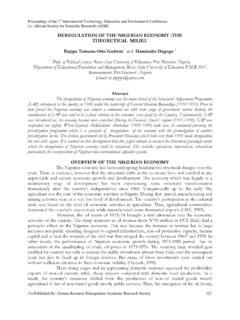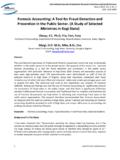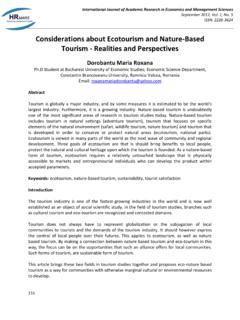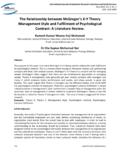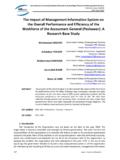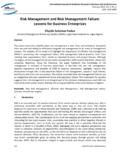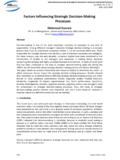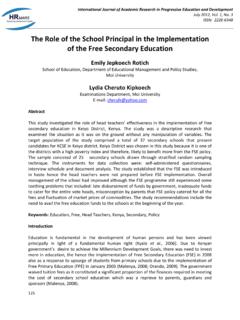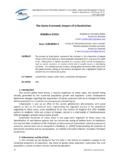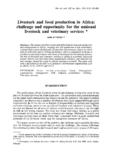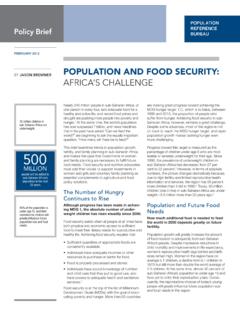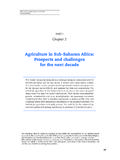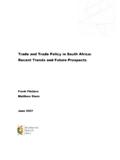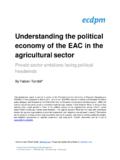Transcription of The Challenges of Agriculture and Rural …
1 International Journal of Academic Research in Progressive Education and Development July 2012, Vol. 1, No. 3. ISSN: 2226-6348. The Challenges of Agriculture and Rural Development in Africa: The Case of Nigeria Dr. Nchuchuwe, Friday Francis Department Of Public Administration, Faculty Of Management Sciences, Lagos State University, Ojo, Lagos State, Nigeria Adejuwon, Kehinde David Department Of Public Administration, Faculty Of Management Sciences, Lagos State University, Ojo, Lagos State, Nigeria Email: Abstract Agriculture contributes immensely to the African economy in various ways; namely, in the provision of food for the increasing population; supply of adequate raw materials to a growing industrial sector; a major source of employment; generation of foreign exchange earnings.
2 And, provision of a market for the products of the industrial sector among others. This paper argues that the agrarian sector has a strong Rural base; hence, concern for Agriculture and Rural development become synonymous, with a common root and that the bedrock of Agriculture and agricultural development in Africa is Rural development, without which all efforts at agricultural development will be futile. It observes that African Agriculture remains largely traditional and concentrated in the hands of smallholders and pastoralists, and the neglect of Agriculture has resulted to the mass exodus of Rural dwellers and in turn has made the Rural area qualitatively and quantitatively depopulated, and progressively less attractive for socio- economic investment.
3 It discusses the problems and Challenges posed by this and government responses to the Rural infrastructural needs of the people in the Rural areas. It therefore recommends that for the government(s) agricultural policies to achieve its target, there is need for an adequate level of strategically targeted investment in Agriculture , upgrade Rural infrastructure, boost productivity, and increase competitiveness of the farm output, in addition to fighting corruption. It is the view of the paper that in order to facilitate agricultural development, government should adopt an integrated Rural development approach which is a multidimensional strategy for improving the quality of the life of the Rural people.
4 It concludes that Rural development is imperative for improved of agricultural growth and development in Africa. Keywords: Agriculture , Agricultural development, Rural Development and Integrated Rural Development 45 International Journal of Academic Research in Progressive Education and Development July 2012, Vol. 1, No. 3. ISSN: 2226-6348. Introduction Contemporary events around the world have shown increasing concerns for the 75 percent or more people inhabiting the Rural areas. This is justified by the high correlation that exists between Rural living and poverty with this situation particularly exacerbated in developing countries (World Bank, 1994).
5 Poverty can be said to be determined by a number of factors including the level of economic growth, the way growth affects the poor, the pattern of government spending and the initial distribution of income. Agriculture employs nearly one-half of the labor force in developing countries. Indeed, a high share of Rural communities and especially the Rural poor are directly or indirectly dependent on Agriculture through farming, food processing, fishing, forestry, and trade (Muhammed, 2007). Agriculture is the backbone of Africa's economy. About 70% of Africans and roughly 80% of the continent's poor live in the Rural areas and depend mainly on Agriculture for their livelihood.
6 The sector accounts for about 20% of Africa's GDP (ECA, 2004), 60% of its labor force and 20%. of the total merchandise exports. Agriculture is the main source of income for 90% of Rural population in Africa. Agriculture represents a great part of the Africa's share in world trade. On the list of 20 top agricultural and food commodity importers in 2004, 60% are from Sub- Saharan Africa. African countries represent also 50% of top 20 countries, in terms of the Share of total Agriculture / total exported merchandise in the world (ECA, 2007). Agriculture is faced with fundamental changes. Human population growth, improved incomes and shifting dietary patterns are increasing the demand for food and other agricultural products.
7 At the same time, however, the natural resource base underpinning agricultural production is under threat, with growing threats to genetic diversity and the degradation of land and water resources. Agriculture improves food security in many ways, most fundamentally by increasing the amount of food but also by providing the means to purchase food. Through growth in agricultural productivity and higher farm profits, the Rural poor can generate additional income to purchase more food, including more diverse kinds of food. Despite the strategies adopted by various governments in Nigeria to address Agriculture and Rural underdevelopment problem, the story remains the same.
8 There are still inequality and poverty particularly in the Rural areas. There are a lot of public complaints on the underdevelopment situations of many Rural areas which constitutes a threat to Nigeria's vision of becoming one of the twenty strongest economies by the year 2020 (vision 2020). A lot of resources (financial) have been injected, but all in vain (Yakubu, 2009). Agriculture And Rural Development: Conceptual Issues The definition of Agriculture changes over time. Agriculture is the cultivation of plants and husbandry of animals, that is, the management of living things and ecosystems to produce goods and services for the people. Agriculture includes farming; ranching; aquaculture.
9 Apiculture; horticulture; viticulture; animal husbandry, including, but not limited to, the care 46 International Journal of Academic Research in Progressive Education and Development July 2012, Vol. 1, No. 3. ISSN: 2226-6348. and raising of livestock, equine, and fur-bearing animals; poultry husbandry and the production of poultry and poultry products; dairy production; the production of field crops, tobacco, fruits, vegetables, nursery stock, ornamental shrubs, ornamental trees, flowers, sod, or mushrooms;. timber; pasturage; any combination of the foregoing; the processing, drying, storage, and marketing of agricultural products when those activities are conducted in conjunction with, but are secondary to, such husbandry or production.
10 The sustainability of Agriculture in African region cannot be isolated from the sustainability of development in the region and beyond. A number of other related definitions are also in common usage. The American Society of Agronomy, for example, defines sustainable Agriculture as: one that, over the long term, enhances environmental quality and the resource base on which Agriculture depends, provides for basic human food and fiber needs, is economically viable, and enhances the quality of life of farmers and society as a whole (Uptal, 2001). Another definition by MacRae et al. (1990) posits that: Sustainable Agriculture is both a philosophy and a system of farming.
